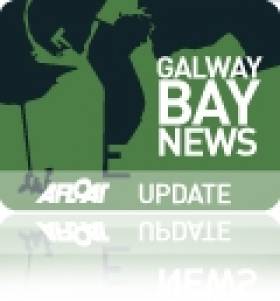Displaying items by tag: Our Lady's Children's Hospital Crumlin
Galwegian Special Olympian Athletes Celebrate On board Navy's Flagship
The world games which were held during June and July saw over 7,500 athletes from 185 countries participate in the Greek capital. Team Ireland in total brought home 107 medals, with athletes from Galway securing 11 medals and a number of ribbons in a variety of sports.
Speaking about the reception, Regional Director Myra Merrick said: "We are honoured to have the Naval Service docking in Galway especially for the function. The athletes deserve a warm reception and recognition for their wonderful success. It's a huge achievement in itself to participate at World Games level, let alone bring back a medal".
"The event presents an exceptional opportunity for the public to extend congratulations to our local sporting heroes, explore the Defence Forces vessel and meet the officers" she added.
The 1984 built /1,910 tonnes 'helicopter patrol vessel' and her seven fleetmates are all each assigned to a particular charity. In the case of L.E. Eithne she is associated with Our Lady's for Sick Children, Crumlin in Dublin.
Charity Fun Sailing Race at Royal St George
The Royal St George Yacht Club will host its first charity fun sailing race in aid of Our Lady’s Children’s Hospital Crumlin on Friday 22 July.
The race is open to all with a suggested entry feel of €5 for every crew member. Following the action the RSGYC will host an aprés race party for all participants and friends.
And since fun is the aim of the day, there is also a fancy dress option with a prize for the best dressed person!
Entries can be made online at the RSGYC website or alternatively by e-mail to [email protected].
Our Lady's Children’s Hospital Crumlin is an acute paediatric teaching hospital and is Ireland's largest paediatric hospital, being responsible for the provision of the majority of tertiary care services for children and medical research for childhood illnesses in Ireland.
For more than 50 years, Our Lady’s Children’s Hospital have relied on fund raising to help ensure that critically ill and injured children have access to the highest quality care. Contributions are invested in outstanding paediatric care and research to help the nation's sick children and continue to support efforts to ensure healthier children and happier lives.






























































